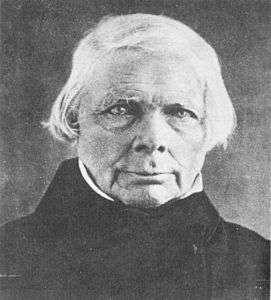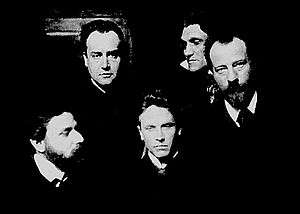In Praise of Polytheism
In Praise of Polytheism (On Monomythical and Polymythical Thinking) (German: Lob des Polytheismus. Über Monomythie und Polymythie) is an essay by the German philosopher Odo Marquard, held as a lecture in 1978 and published in 1979. It posits that the separation of powers has its origin in polytheism, and defends what it calls "enlightened polymythical thinking".[1] The essay has provoked discussion and controversy in Germany.
Summary
Marquard writes that human consciousness never has undergone any process of demythologisation. He sympathises with Claude Lévi-Strauss's, Hans Blumenberg's and Leszek Kołakowski's positions on myths, and writes that the story of demythologisation is itself a myth. Myths are stories, and not primitive precursors to knowledge; knowledge is about finding truths, and storytelling is how humans engage with known truths in their lifeworld. New knowledge will therefore only lead to new myths. Marquard compares the changing of myths to the changing of clothes and writes that the Enlightenment was not a "striptease"; "mythonudism" is not possible.[2]

Myths can be harmful or wholesome. Monomythical thinking—allowing only one story—is harmful, because it causes narrative atrophy. Polymythical thinking is a separation of powers, where different stories keep each other in check and the manifoldness of the individual can exist. The chief example of a monomyth is world history as progress toward emancipation, a myth which emerged in the philosophy of history of the mid-18th century and turned "histories" into the singular "history". Marquard calls it the second end of polymythical thinking, after the end of religious polytheism. The Christian Trinity may be polytheistic, but the salvation story is not, and ends in nominalistic "storylessness".[4]
Marquard describes the emancipation story as a failed attempt to secularise the salvation story. Like its precursor, it is a story about the termination of myth, but nonetheless, it became a new mythology. After the new mythology emerged, an uneasiness about the monomyth began to show. It expressed itself as an increased interest in the exotic, including classical antiquity, orientalism and the Germanic mythology in Richard Wagner's works. In his contemporary West, Marquard sees the same "mythological orientalism" in Maoism and tourism. This countermovement has never offered a solution, because it merely submits exotic mythology to the monomyth of progress and confirms its domination.[5]
Marquard's solution is "enlightened polymythical thinking".[1] The modern world began when monotheism was disenchanted. This also led to "the disenchanted return of polytheism",[6] in the form of political separation of powers. The individual re-emerged, having existed under polytheism's separation of powers, and first being formulated under the threat from monotheism. The key is to recognise that myths are stories, which makes it possible to identify modern polymythical thinking. It exists in the scientific study of history and in the novel. For philosophy to break with the monomyth, it must allow dissent and tell stories again, defying charges of relativism and scepticism.[7]
Publication history
Marquard gave "In Praise of Polytheism" as a lecture at the Technical University of Berlin on 31 January 1978. It was first published as an essay in 1979 by Walter de Gruyter in the anthology Philosophie und Mythos. Ein Kolloquium.[8] It has been included in several collections of Marquard's works, starting with Farewell to Matters of Principle (German: Abschied vom Prinzipiellen), published in German in 1981 and in English translation by Robert M. Wallace in 1989.[9] Marquard developed the arguments further in the text "Aufgeklärter Polytheismus—auch eine politische Theologie?" ["Enlightened polytheism—also a political theology?"] which was published in a 1983 anthology about the legacy of Carl Schmitt.[10]
Reception

The essay has been at the centre of discussion and controversy in Germany.[11] In 1983, the sociologist of religion Jacob Taubes criticised it by suggesting that it outlines a "philosophical choreography" for present-day "Cosmicists", referring to a group of mystics and neopagans in turn-of-the-century Munich.[12] Taubes wrote that rather than describing a "mythical state of mind", the essay produces one,[12] and that "recourses to mythos post Christum are really just repetitions of Julian's apostasy".[13] Taubes connected Marquard's project to Alain de Benoist's book On Being a Pagan (1981) and thereby associated it with the neopaganism of the Nouvelle Droite in France.[14]
The Roman Catholic theologian Alois Halbmayr wrote his doctoral dissertation as a response to Marquard's essay.[15] Halbmayr argued that the separation of powers that Marquard requests can be found in the Christian concept of the Trinity. With that in mind, he called for resumed critical discussions about hope and ethics within the theology and philosophy of history.[16] The Lutheran theologian Klaus Koch wrote that Marquard's "noble-philosophical diction" in the essay has the effect that "you don't know to what extent the matter is meant as serious or conceived in his cups".[17]
In 2007, the sociologist Richard Faber compared the essay to Hans Blumenberg's book Work on Myth, and wrote that Marquard's clear interest in polytheism as political pluralism "explicates what Blumenberg only implies".[18] Countering Marquard, Faber wrote that polytheism is not the seed to the separation of powers, because "the Homeric gods are oligarchs equal to the Greek lords, who are waging a war of (self-)destruction",[19] and polytheism is an "oligotheism" destined to fail.[19] Faber wrote that "political poly-theologians", unlike "political mono-theologians" like Schmitt and Rüdiger Altmann, "cannot see that in reality pluralism has long become integralism (or rather: corporatism)."[19] In her 2016 book on Germanic neopaganism, Stefanie von Schnurbein grouped Marquard's essay with texts written by Botho Strauß and Martin Walser in the 1990s.[20] The three authors share a "post-modern, post-structuralist and post-colonial impulse, which posits a logic of difference against a unifying, colonializing logic of sameness".[21] Due to the nationalist implications of Strauß' and Walser's texts, Schnurbein wrote that "Taubes' early critique of Marquard is not as far-fetched or one-sided as it might have seemed at the moment of its publication in 1983".[21]
References
Citations
- Marquard 1989, p. 100.
- Marquard 1989, pp. 87–92.
- Marquard 1989, pp. 97–98.
- Marquard 1989, pp. 92–96.
- Marquard 1989, pp. 96–100.
- Marquard 1989, p. 101.
- Marquard 1989, pp. 100–105.
- Marquard 1989, pp. 138–139.
- Marquard 1989.
- Marquard 1983, pp. 77–84.
- Gladigow 2001, p. 144.
- Gladigow 2001, p. 145.
- Taubes 1983, p. 464, quoted in Gladigow (2001, p. 146)
- Gladigow 2001, p. 146.
- Halbmayr 2000. The dissertation was defended in 1998 and published as a book in 2000.
- Hailer 2006, p. 194.
- Koch 1999: "...in vornehm-philosophischer Diktion wie etwa bei Odo Marquard, bei der man nicht weiß, inwieweit die Sache ernst gemeint oder einer Weinlaune entsprungen ist."
- Faber 2018, pp. 112–113.
- Faber 2018, p. 113.
- Schnurbein 2016, pp. 160–162. The texts in question are Botho Strauß' 1993 essay "Anschwellender Bocksgesang" and Martin Walser's contributions to the public polemic that essay resulted in.
- Schnurbein 2016, p. 162.
Sources
- Faber, Richard (2018) [2007]. Political Demonology: On Modern Marcionism. Translated by Feiler, Therese; Mayo, Michael. Eugene, Oregon: Cascade Books. ISBN 978-1-4982-0129-2.
- Gladigow, Burkhard (2001). "Polytheismus". In Kippenberg, Hans G.; Riesenbrodt, Martin (eds.). Max Webers 'Religionssystematik' (in German). Tübingen: Mohr Siebeck. ISBN 3-16-147501-1.
- Hailer, Martin (2006). Gott und die Götzen. Über Gottes Macht angesichts der lebensbestimmenden Mächte (in German). Göttingen: Vandenhoeck & Ruprecht. ISBN 3-525-56336-1.
- Halbmayr, Alois (2000). Lob der Vielheit. Zur Kritik Odo Marquards am Monotheismus. Salzburger Theologische Studien (in German). 13. Innsbruck: Tyrolia Verlag. ISBN 3-7022-2255-3.
- Koch, Klaus (1999). "Monotheismus als Sündenbock?". Theologische Literaturzeitung (in German). 124 (9): 873–884. ISSN 0040-5671.
- Marquard, Odo (1983). "Aufgeklärter Polytheismus—auch eine politische Theologie?". In Taubes, Jacob (ed.). Der Fürst dieser Welt. Carl Schmitt und die Folgen. Religionstheorie und politische Theologie (in German). 1. Munich: Wilhelm Fink. pp. 77–84. ISBN 3506771612.
- Marquard, Odo (1989). "In Praise of Polytheism (On Monomythical and Polymythical Thinking)". Farewell to Matters of Principle: Philosophical Studies. Translated by Wallace, Robert M. New York and Oxford: Oxford University Press. pp. 87–110. ISBN 0-19-505114-9.
- Schnurbein, Stefanie von (2016). Norse Revival: Transformations of Germanic Neopaganism. Leiden and Boston: Brill Publishers. ISBN 978-90-04-30951-7.
- Taubes, Jacob (1983). "Zur Konjunktur des Polytheismus". In Bohrer, Karl Heinz (ed.). Mythos und Moderne. Begriff und Bild einer Rekonstruktion (in German). Frankfurt am Main: Suhrkamp Verlag. pp. 457–470.
Further reading
- Blumenberg, Hans (1985) [1979]. Work on Myth. Translated by Wallace, Robert M. Cambridge, Massachusetts: MIT Press. ISBN 978-0-262-52133-8.
- Marquard, Odo (1979). "Lob des Polytheismus. Über Monomythie und Polymythie". In Poser, Hans (ed.). Philosophie und Mythos. Ein Kolloquium (in German). Berlin and New York: de Gruyter. pp. 40–58. ISBN 3-11-007601-2.CS1 maint: ref=harv (link)
- Schmitt, Carl (1986) [1922]. Political Theology: Four Chapters on the Concept of Sovereignty. Translated by Schwab, George D. Cambridge, Massachusetts: MIT Press. ISBN 9780262192446.